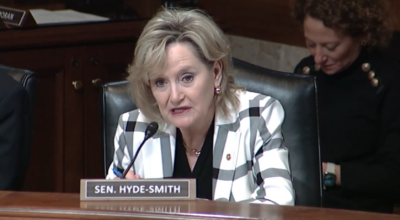Doty hopeful hospital bill will survive
Published 8:34 pm Saturday, March 4, 2017
Sen. Sally Doty, R-Brookhaven, is hopeful a bill that would allow non-profit hospitals to recover bad debt from any state tax refund will survive after it stalled in the Senate last week.
The Senate delayed House Bill 687 Thursday that would allow the state to withhold income tax refunds from Mississippians who owe debt to public and private non-profit hospitals and community colleges. Those who owe debts greater than $100 to nonprofit hospitals and $25 to community colleges could have tax refunds withheld. The practice is already used for uncollected four-year university and child support debts, but if the bill passes, nonprofit hospitals would be the first private entity able to draw state assistance to collect outstanding debts.
“I have worked closely with Alvin Hoover (CEO of) King’s Daughters Medical Center and the Mississippi Hospital Association over this bill for six years now and we have finally gotten it to the floor for a vote,” she said. “I laid the bill on the table subject to call to sort out some parliamentary and other issues but I am optimistic that the bill will survive.”
The bill originally included provisions only for community colleges to collect outstanding debt. That bill would add community colleges to existing law that allows four-year universities to collect unpaid debts through the tax refund offsets.
Doty added the hospitals provision to the bill after a similar bill she sponsored dealing with hospitals died in committee in late January.
Sen. Briggs Hopson, R-Vicksburg, said he was concerned over non-public entities claiming state tax refunds and wondered what kind of precedent it could set for other businesses in the private sector.
“These hospitals have responsibilities to take in patients under federal guidelines,” Doty told the media Thursday. “Our nonprofit hospitals certainly need this help. My local hospital (KDMC) has around $12 million in uncollected debt. And other states allow this procedure, like South Carolina. This bill would give our hospitals a little extra revenue when times are tight.”
The bill had to pass through two Senate committees – Finance and Public Health – on Tuesday to stay alive. Senators debated the bill in the Finance committee for about 15 minutes, and it was rushed through the Public Health committee with no debate hours before the 8 p.m. deadline.
The bill in its current form treats the community colleges differently than the hospitals. Existing law gives four-year universities the authority to work with the Department of Revenue to determine outstanding debt, and the revenue department then withholds tax refunds when necessary. An appeals process is available for those who wish to dispute those offsets after the fact.
But the section of the bill dealing with hospitals would first require a judgment from a county’s Justice Court judge, who after a hearing could authorize the Department of Revenue to withhold an individual’s refund.
“The committee chair can call the bill off the table and there will be a parliamentary ruling by the lieutenant governor,” she said. “Then, hopefully, the hospital portion will go forward for a vote. The bill would then go to the House for concurrence or no-concurrence.”
Another of Doty’s bills, which would allow divorce on the grounds of domestic abuse died without a vote in a House committee. “This was particularly disappointing because the House overwhelmingly voted in support of this bill last year — however the bill ultimately died on the Senate side after additional grounds were added in conference,” she said.
The Campaign Finance Reform bill is still alive and Doty expects the bill to pass both chambers this year. “I believe the House took up my bill but stripped out the Senate language and added the House language in a ‘strike-all’ amendment,” she said. “I expect this bill to go to conference for the Senate and House to iron out the final differences.”
A version of Doty’s bill to protect vulnerable adults from financial exploitation is still alive, but she is amending some language to satisfy some concerns from financial professionals, she said.
Her bill to allow in-person absentee voting at the courthouse by machine failed in the House, as did her bill to allow college students to have a registrar serve as an attesting witness on any absentee ballot. “I will file both of these bills next year, and plan to get more background information out to the House committee members to get them more comfortable with these changes,” she said.
Doty’s revenge porn and “sex-tortion” bill died last week in the House Judiciary B committee. The bill would have provided a civil cause of action, injunctive relief or criminal penalties for sharing intimate pictures or video online without consent. Doty said the public release of intimate photographs can have devastating effects on individuals and her goal with this bill was to punish offenders and prevent the “sex-tortion” from occurring. “I am quite surprised that this bill was not brought out of committee,” she said.
Rep. Becky Currie, R-Brookhaven, continues to push for a bill that would allow students to drink bottled water on a school bus. “The water bill that I wrote for school buses apparently turned out to be controversial, which was very odd to me,” she said. “I had written it for a mother that asked me for this bill and I am her voice. If it makes it through the process great and if it doesn’t, I have done what my constituents have asked me to do.”
Currie said she checked with several school districts and the rules concerning beverages on school buses were varied. Currie thought allowing students water was “a no brainer,” she said.
“Some districts, you can eat and drink anything, some you could have water and many you couldn’t have anything. So I thought that if we put children in a tin can when it is over 100 degrees with no air conditioning, for goodness sake, let them have water,” she said. “Apparently many people did not agree.”
Currie said she’s been told the bottle of water could become a projectile to injure other students. “I suppose a child that wants to throw something has books, pencils and very heavy book bags and many other things that could be used as projectile objects,” she said. “With all the things going on in the state who knew this was going to become such a big deal?”
She said the House is trying to tighten absentee balloting laws and make voting as convenient and safe as possible for workers. “We don’t want you to go in and have to lie about being out of town so you can vote (early), but I do want to see our election laws modernized, fair, but legal,” she said. “The House is putting forth real measures to fix issues and improve the voting process. I see both sides of this issue and I am sure it is something that will continue to be worked on in the House and Senate.”
Currie, a nurse, said she was most disappointed that HB 909 died in the Senate. The bill would have amended a law to require the state and school employees health insurance plan to include coverage for pap smears and PSA tests as part of the annual wellness coverage. “Blue Cross has now decided that they will only pay for a pap smear once every three years,” she said. “With cervical cancer on the rise, I am afraid there will be women to die from a very preventable cancer so that they (the insurance company) can save a few dollars a year. I am very disappointed in Blue Cross and disappointed that the bill died.
“I could not force a company to supply services to a client but the bill directed the state health plan to provide the annual pap test to state employees.”
Currie said she will not give up on the bill and will introduce it again next year.
“Maybe we would be able to save a few lives. I will definitely keep trying as this is very important to all women,” she said.







